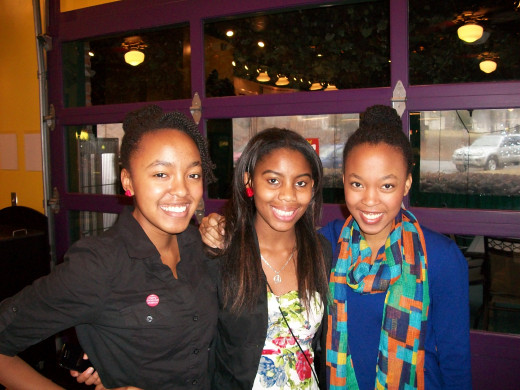Making and Keeping Friends

Hey Everyone,
I've been thinking of writing this piece for some time now. I've thought so long and hard about how friendship is so essential to life and without it, I don't know where I would be. So I decided to do some research on the psychology of friendship and tell you how important friendship really is. If you have a close group of friends you find yourself lacking the feeling of being misplaced or being alone. That's what friendship does for everyone. Hopefully with this article you'll learn some things about friendship you never really knew before. Come take a look.

Benefits of Friendship
- Equality: Everyone is equal in a friendship
- Individualism: Friendships exist independently.
- Choice: Friends are chosen.
- Self-Expression: Friends give us back an image of ourselves.
- Freedom: Friendships require no prerequisite commitments.
- Fluidity, Flexibility, and Possibility: Being friends with whomever, however, for as long as we want.
Provided By: PsychologyToday.com
How To Make Friends
When I discovered the benefits of the modern friendship, I realized how important these friendships really are. One might say that having a great friend is even better than having a wonderful lover at your side. For as long as we know, friendships have shaped us and molded us into the people we grow to be. At twenty-four I've come to known some really wonderful people that I call my friends. They do not judge me, but they guide me. They do not ask what I would not ask of them. They are committed and I am committed. It is all by choice and in good graces. After reading what Psychology Today had to say about friendship, I decided to add in some of my own thoughts and ideals about the subject. Firstly I want to tell everyone the best way to make friends and form friendships.
Childhood: The first place that anyone can make friends would be during your childhood. Usually these friends are made simply because you live near them. You have nothing in common, but that you're both young and want to spend time with each other. Most people have at least one friend from their childhood who they've stuck with over the years. It's hard to make friends at childhood if you're shy, but it can definitely help bring you into to adolescent years.
Adolescence: Once you've hit adolescence, some of those childhood friends have vanished. This will happen anyway as it's a natural part of growth. Now that you've grown older you have begun to have a preference of the type of people you want to spend time with. You make less friends over this time as you're growing and having an eye for certain people. If you like to remain calm and collected, you may find yourself being around calm and collected people. It just works out that way, really. You'll eventually develop a circle of friends. Some of them might not meet your specific needs, but they fill a void.
Adulthood: Making friends as an adult is difficult. It means that you'll have to get along with other adults who have become set in their ways. This means they have chosen how they will act and will most likely remain the same for the remainder of their years. By this time your friends made in adolescence have all but vanished. They have found their own lives and have left you behind, but it doesn't mean you won't ever make new friends. It just takes a lot more work. Adults have the hardest time make friends. There are certain avenues in which to make friends.
- Work: Work is an awesome place to make new friends. Just start up a conversation and explore the other person. You might find that you click really well or that you don't like that person. It doesn't hurt to start a conversation and see where things go. As two adults, it's fun to talk about things that are common between the two of you.
- Friend Of A Friend: Somewhere between your childhood and adulthood you've made Friends of Friends. These are your friends' friends. Sometimes you might see them on occasion and sometimes you end up closer to them. This is definitely something to consider. Sometimes in adulthood you realize that your friend's friend has become one of your good friends. It doesn't happen often, but it can happen.
- Bars, Clubs, Events: Friends can be made in all different places and in different parts of your life. If you're an adult now, you can say you have many average friends or a few great friends. Some people like to be surrounded by a group of friends while others prefer much more intimate friendships. Making friends might require a person to go out more to clubs, bars, work events, parties. Sometimes it takes that much effort to make a new friend. Though the real trick to making friends is keeping friends. You can't do one without the other.
How To Form Long Lasting Friendships
Nurturing friends is something that many people don't understand. Like I said, your friend-making ability begins at childhood. Sometimes a child will make a friend for several days but it doesn't seem to work out. Here are some things to do when nurturing new acquaintainces:
- Pay Attention: One thing that is universally true about nurturing friends is that you have to pay attention to them. That means listening when they speak, knowing their favorite flavor of ice cream and understanding why he or she is mad. When attempting to make a new friend, don't introduce yourself and tell your story. Let your new acquaintance tell their story and then allow them the chance to ask you. This shows you are interested in getting to know them. This also shows that you're paying attention.
- Devote Time: The hardest thing about having a lot of friends is finding time to spend with them. A very social person may have ten to twelve friends but finds difficulty allotting time for each one. They may host many parties and get-togethers in order to accommodate the large group, though some friends require a more intimate setting, generally in a smaller group or one-on-one. So take time to nurture the individual friends if you can. It'll mean all the difference in the world.
- Open Your Heart: There are certain people who have a closed heart. This means that that person will not want help or advice from their new acquaintance. Sometimes a new acquaintance has already seen you as a good friend, but they cannot be nurtured if you close them out. When you close your heart, their need to help will be destroyed. If you don't open your heart to them when it's important, your friend will recoil. They will feel bad about themselves. If your heart is just not ready, make it known that you want to open your heart, but can't. Be completely honest. There's nothing better than honesty.
- Keep Them In The Loop: This is almost the same as opening your heart. However, the loop is the place where all the important things in your life occur. Keeping someone in the loop will make them feel valued and respected. Keep your new friend in the loop about major life changes (a move, sickness, etc). If you fail to keep them in the loop, they'll turn away from you, feeling invaluable.
- Listen, Offer Advice, The Mushy Stuff: A new friend may come to you for advice. It may come as to shock to you, but you must acknowledge that this person values your opinion. You should not turn them away. You should listen, offer advice, and administer affection when possible. A new friend may be comfortable with a hug or pat on the shoulder. It shows that you care, but not too much. Being there for a friend is the greatest way to nurture them. This is the way you can begin developing a long term friendship.
How To Maintain Long Lasting Friendships
Long Last Friendships are friendships that are considered to be tantamount to a romantic relationship. What I mean to say is that a long last friendship is so intimate and so powerful it's almost as if you are in a romantic relationship. You care, you acknowldege, you love. Those things are important to the friends you've had the longest time. Once you've met a person and nurtured them, it's only natural that you remain friends for years to come. There are things you can do to make or break these long friendships and if you break them, you'll come to realize that that friend meant so much more to you than you know. There are things you can do to form and maintain long lasting friendships.
- Appreciate: Tell your friend how much you appreciate them. You don't have to do anything grandiose or over the top. Just hug them and tell them a few things you like about them and how much you value the friendship. A friend who receives this every so often will stick around having felt appreciated.
- Know The Limits: A friendship is a two sided relationship. Do not take advantage of a friend who is devoted to you. Don't ask for more than what you can provide. Don't require more than they can supply. This is one of the most important things to do. Treat your friend with equal respect and require equal effort. If you want to maintain this relationship, be reasonable.
- Continue To Devote Time: As you grow older time is limited. Despite this, you still should devote time your friend when you can. This might have to be lunch, dinner, a weekend away. Don't leave your friends sitting around waiting for you to call or don't return their messages when they call you. It's just not cool right? Be a good friend, give them time!
- Love On Them!: This sounds a bit weird, but hug your friend, give them a kiss on the cheek or forehead, headbutt, or whatever is appropriate. Your friend, at this point, is like family and they should be treated similarly. A long lasting friend is almost like a sibling and if they've been in your life all this time, they should be treated this way. Love on them, show them affection, tell them! Nothing feels better right?
Making and Keeping friends is difficult whether you're a child or adult. Don't forget to make good strides in the beginning, continue to nurture, and maintain these awesome relationships. Whether you're sad, happy, glad, mad, your friends will be there for you if you've been there for them. Don't forget that.
Was This Article Helpful in Any Way?
Sources For This Article
- Why Friendship is the Key Relationship of the 21st Century | Psychology Today
Equality, choice, and fluidity describe friendship and modern life By Bella DePaulo, Ph.D.... - Why Both Old and New Friends Are Essential for Happiness | Psychology Today
Friends are life’s reward for getting it right By Gina Barreca, Ph.D.... - How to Make Friends: 23 Steps - wikiHow
How to Make Friends. There's a certain beauty in being a lone wolf. You have more time to do the things you want to do, like take introspective walks, read books, write and other solitary endeavors. But it's also nice to have friends....



